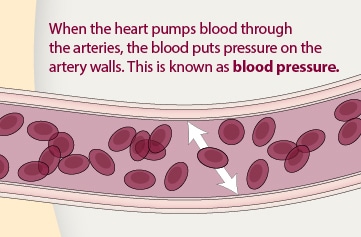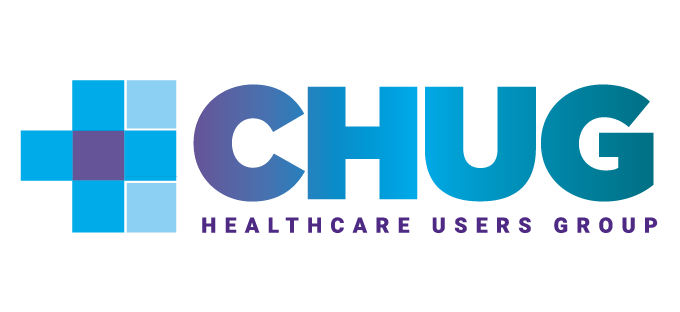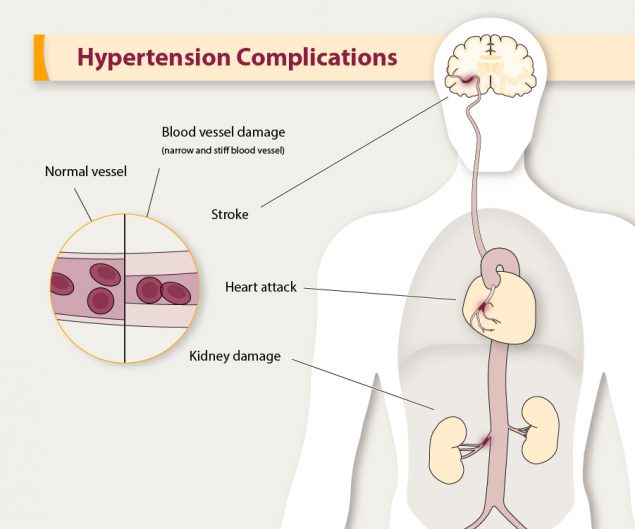Blood Pressure 101- May is High Blood Pressure Awareness Month
HIGH BLOOD PRESSURE SYMPTOMS AND CAUSES

Blood pressure is the pressure of blood pushing against the walls of your arteries. Arteries carry blood from your heart to other parts of your body.
Your blood pressure normally rises and falls throughout the day.
WHAT DO BLOOD PRESSURE NUMBERS MEAN?
Blood pressure is measured using two numbers:
The first number, called systolic blood pressure, measures the pressure in your arteries when your heart beats.
The second number, called diastolic blood pressure, measures the pressure in your arteries when your heart rests between beats.
If the measurement reads 120 systolic and 80 diastolic, you would say, “120 over 80,” or write, “120/80 mmHg.”
WHAT ARE NORMAL BLOOD PRESSURE NUMBERS?
A normal blood pressure level is less than 120/80 mmHg.1
No matter your age, you can take steps each day to keep your blood pressure in a healthy range.
WHAT IS HIGH BLOOD PRESSURE (HYPERTENSION)?
High blood pressure, also called hypertension, is blood pressure that is higher than normal. Your blood pressure changes throughout the day based on your activities. Having blood pressure measures consistently above normal may result in a diagnosis of high blood pressure (or hypertension).
The higher your blood pressure levels, the more risk you have for other health problems, such as heart disease, heart attack, and stroke.
Your health care team can diagnose high blood pressure and make treatment decisions by reviewing your systolic and diastolic blood pressure levels and comparing them to levels found in certain guidelines.
The guidelines used to diagnose high blood pressure may differ from health care professional to health care professional:
- Some health care professionals diagnose patients with high blood pressure if their blood pressure is consistently 140/90 mm Hg or higher.2 This limit is based on a guideline released in 2003, as seen in the table below.
- Other health care professionals diagnose patients with high blood pressure if their blood pressure is consistently 130/80 mm Hg or higher.1 This limit is based on a guideline released in 2017, as seen in the table below.
| BLOOD PRESSURE LEVELS | |||
|---|---|---|---|
| THE SEVENTH REPORT OF THE JOINT NATIONAL COMMITTEE ON PREVENTION, DETECTION, EVALUATION, AND TREATMENT OF HIGH BLOOD PRESSURE (2003 GUIDELINE)2 | The American College of Cardiology/American Heart Association Guideline for the Prevention, Detection, Evaluation, and Management of High Blood Pressure in Adults (2017 Guideline)1 | ||
| Normal | systolic: less than 120 mm Hg diastolic: less than 80 mm Hg |
Normal | systolic: less than 120 mm Hg diastolic: less than 80 mm Hg |
| At Risk (prehypertension) | systolic: 120–139 mm Hg diastolic: 80–89 mm Hg |
Elevated | systolic: 120–129 mm Hg diastolic: less than 80 mm Hg |
| High Blood Pressure (hypertension) | systolic: 140 mm Hg or higher diastolic: 90 mm Hg or higher |
High blood pressure (hypertension) | systolic: 130 mm Hg or higher diastolic: 80 mm Hg or higher |
If you are diagnosed with high blood pressure, talk with your health care team about your blood pressure levels and how these levels affect your treatment plan.
WHAT ARE THE SIGNS AND SYMPTOMS OF HIGH BLOOD PRESSURE?
High blood pressure usually has no warning signs or symptoms, and many people do not know they have it. Measuring your blood pressure is the only way to know whether you have high blood pressure.
WHAT CAUSES HIGH BLOOD PRESSURE?
High blood pressure usually develops over time. It can happen because of unhealthy lifestyle choices, such as not getting enough regular physical activity. Certain health conditions, such as diabetes and having obesity, can also increase the risk for developing high blood pressure. High blood pressure can also happen during pregnancy.
WHAT PROBLEMS DOES HIGH BLOOD PRESSURE CAUSE?
High blood pressure can damage your health in many ways. It can seriously hurt important organs like your heart, brain, kidneys, and eyes.
The good news is that, in most cases, you can manage your blood pressure to lower your risk for serious health problems.
Heart Attack and Heart Disease
High blood pressure can damage your arteries by making them less elastic, which decreases the flow of blood and oxygen to your heart and leads to heart disease. In addition, decreased blood flow to the heart can cause:
- Chest pain, also called angina.
- Heart attack, which happens when the blood supply to your heart is blocked and heart muscle begins to die without enough oxygen. The longer the blood flow is blocked, the greater the damage to the heart.
- Heart failure, a condition that means your heart can’t pump enough blood and oxygen to your other organs.
Stroke and Brain Problems
High blood pressure can cause the arteries that supply blood and oxygen to the brain to burst or be blocked, causing a stroke. Brain cells die during a stroke because they do not get enough oxygen. Stroke can cause serious disabilities in speech, movement, and other basic activities. A stroke can also kill you.
Having high blood pressure, especially in midlife, is linked to having poorer cognitive function and dementia later in life. Learn more about the link between high blood pressure and dementia from the National Institutes of Health’s Mind Your Risks® campaign.
What you don’t know about high blood pressure could hurt you. It affects nearly 50% of American adults, yet many with the condition don’t know they have it.
Learn about the benefits and risks of blood pressure medicines and steps you can take to keep a healthy blood pressure.
Learn statistics and other facts about hypertension (high blood pressure) in the United States.
High blood pressure (hypertension) is a common but dangerous condition. Get information about high blood pressure from the CDC.
Learn about how you can prevent and treat high blood pressure during pregnancy, which can put you and your baby at risk for health problems.
High blood pressure, also called hypertension, has no warning signs or symptoms. Get facts about high blood pressure from the CDC.
A CDC study shows that many kids and teens have high blood pressure and other risk factors for heart disease and stroke. Learn what you can do.
Getting good sleep isn’t just important for your energy levels—it’s critical for your heart health, too. Learn how sleep is connected to heart health.
There are several causes of or risk factors for high blood pressure. Fortunately, you can control many of them.
Learn steps you can take to lower your risk for health problems from high blood pressure (also called hypertension), such as heart disease and stroke.
Quizzes
- Blood Pressure 101: Know the Basics
Share this quiz to help your networks brush up on their blood pressure basics. - Do You Know How to Measure Your Blood Pressure?
Do your patients know how to measure their blood pressure? Share this quiz.

